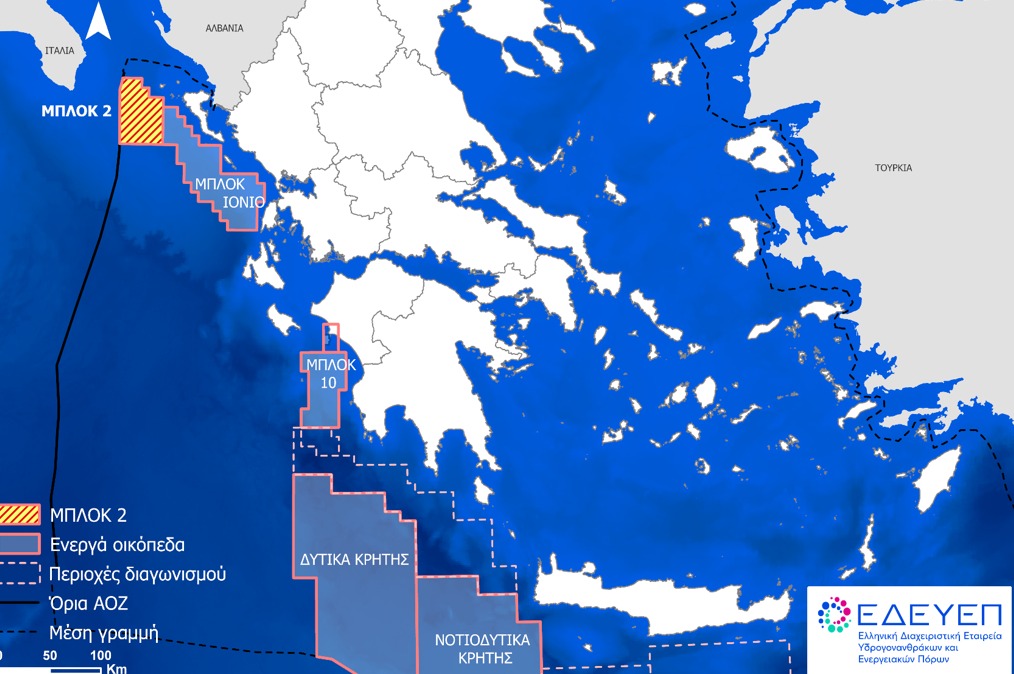The deepening of U.S.–Greece relations, Greece’s emergence as a key energy hub in Southeastern Europe, and a reminder of how economic diplomacy now shapes global geopolitics -all converged in the signing of a landmark agreement that gives ExxonMobil a 60% stake in a joint venture with Energean and Helleniq Energy for Block 2, located in the northern Ionian Sea.
What makes this development even more significant is that, according to Greek Prime Minister Kyriakos Mitsotakis, the first exploratory drilling may begin within 18 months—the first of its kind in Greece in 40 years.
The deal, signed by executives of the three companies in the presence of U.S. Energy Secretary Chris Wright, U.S. Interior Secretary Doug Bergman, Greece’s Energy Minister Stavros Papastavrou, and U.S. Ambassador Kimberly Guilfoyle, underscores both the strengthening of American presence in Greece and the potential for major economic benefits for the country’s energy sector.
A Vote of Confidence in Greece’s Energy Future
Energean CEO Mathios Rigas emphasized that it will be the upcoming exploratory drilling that determines the real prospects of Block 2—though initial indicators are promising. “This is a critical step toward understanding Greece’s untapped potential,” he said.
Prime Minister Mitsotakis called the agreement a “historic moment” for Greece. “We are fulfilling our commitment: to develop our national resources with vision and planning, for a Greece that is energy-secure, geopolitically strong, and attractive to investors,” he declared.
For Athens, ExxonMobil’s participation is more than a business move—it is viewed as a “vote of confidence” in Greece’s credibility as a reliable partner and ally in Southeastern Europe.
Washington, too, has taken note of Greece’s progress. Finance Minister Kyriakos Pierrakakis pointed out, “Since 2019, Greece has restored fiscal stability, reduced its debt, and created a foundation for new investments.”
A Move Aligned With Trump’s Energy Doctrine
The agreement for Block 2 also reflects the business-first strategy of U.S. President Donald Trump, who prioritizes business interests as a lever of geopolitical influence and a tool for resolving bilateral or multilateral issues.
In line with Trump’s famous slogan, “Drill, baby, drill,” the deal reinforces Washington’s commitment to the exploration and expansion of oil and gas production as a cornerstone of U.S. energy policy.
Close allies of the president—such as Wright, Bergman, and Ambassador Guilfoyle—are seen as key figures in delivering tangible results, or what insiders refer to as “deliverables”: agreements that benefit American companies and bolster U.S. influence abroad. Guilfoyle, notably, has launched her tenure in Athens with striking dynamism.
The Next Phase: Europe’s Energy Independence
Attention now turns to the Vertical Gas Corridor, a strategic network aimed at reducing Europe’s dependence on Russian energy.
“For us, the corridor represents a joint effort to secure prosperity,” Minister Papastavrou said.
All eyes are on whether European energy ministers meeting in Athens will move forward with agreements to import American LNG (liquefied natural gas) via Greece, which is increasingly viewed as the gateway for U.S. gas into Europe.
“Greece is the perfect entry point with the right infrastructure,” said Wright, highlighting Greece’s growing role in the region’s energy architecture.
A Regional Power Shift
Athens believes that a sharp rise in U.S. LNG flows northward will not only solidify U.S.–Greece relations but also strengthen Greece’s strategic role in the Eastern Mediterranean.
Wright pointed to the vast gas reserves in the United States, calling this an opportunity to replace Russian natural gas across Europe, provided costs can be lowered through long-term, fixed-price contracts.
Meanwhile, Chevron has expressed interest in Greece’s Crete-1 and Crete-2 offshore blocks. These developments carry geopolitical weight, as the growing U.S. presence indirectly reaffirms Greece’s sovereign rights in maritime zones defined by the “Maniatis Law” (2011)—a point likely to raise tensions with Turkey, bringing Ankara face-to-face not just with Athens, but potentially with Washington as well.
